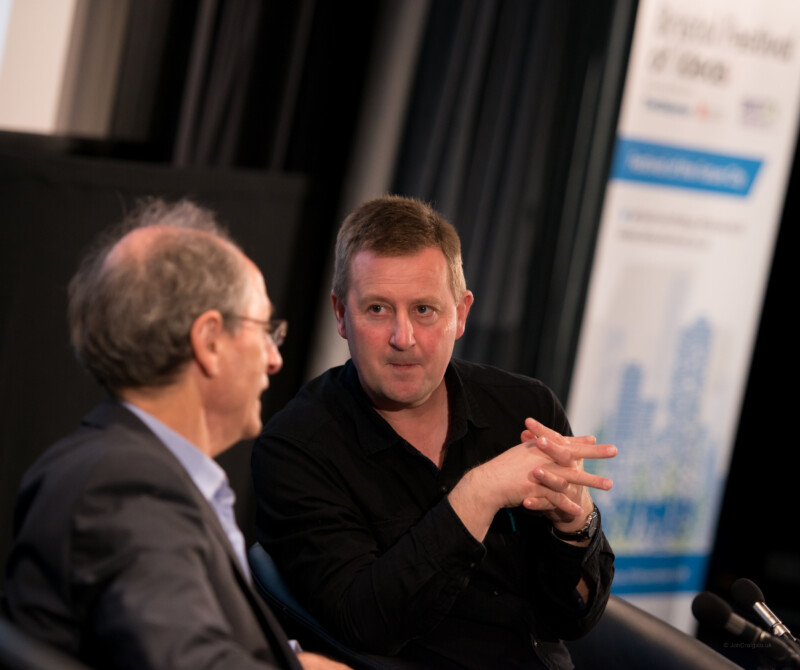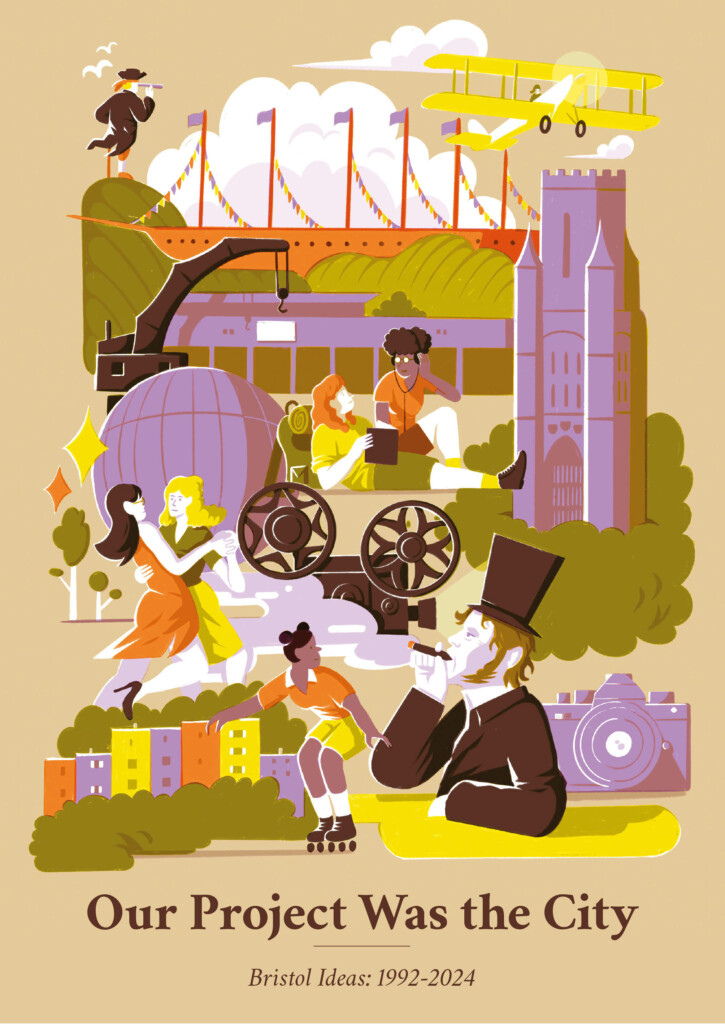Bristol as a City of Ideas Julian Baggini

Share this
Julian Baggini interviewing Sir Michael Marmot, Festival of the Future City, 2015. (Jon Craig)
Julian Baggini is one of Britain’s most well-known public philosophers. He worked with Bristol Ideas for more than 15 years, interviewing writers and commentators, judging our book prize, and presenting and debating his work. Baggini writes about Bristol Ideas and the city of Bristol as a ‘philosophy town’.
Around the world there are towns and cities known for their arts, crafts and culture. There are places famous for their bookshops, lacemaking, pottery, weaving, concentrations of artists’ studios and so on. Bristol is well-known as a world-leading centre of contemporary music, animation and wildlife filmmaking. But nowhere is known as a philosophy town.
The very idea sounds almost comical, at least to the British, with their traditional disdain for high theory. Still, in the early years of this millennium there was a plan to make Malmesbury in Wiltshire – the birthplace of the seventeenth century philosopher Thomas Hobbes – a philosophy town, but that failed to come to anything.
Over the lifetime of Bristol Ideas (including its forerunner, the Bristol Festival of Ideas), our city has had perhaps the strongest claim to be the United Kingdom’s capital of public philosophy. The boast becomes more credible when you consider how the word ‘philosophy’ should be used. People often point to France as a country where philosophy is much more a part of public life than it is in the UK. But la philosophie is a much broader domain of enquiry than it is here, including aspects of political theory, sociology, anthropology, economics and psychology.
So, although only a small (but significant) proportion of Bristol Ideas’ work has come under the formal umbrella of ‘philosophy’, much of it has been extremely philosophical. Cynics and sceptics may ask how this has benefited the city, and their doubts ought to be taken seriously. First, even the most popular philosophical events only attract a tiny proportion of Bristolians, and most of these people probably already have some kind of interest. Can public events really galvanise interest in ideas, or do they simply satisfy the desires of those who already have a thirst for them?
A second worry is that talks and panels give people the illusion of encountering depth in a 60-minute reality that is actually quite superficial. Consider the TED talk phenomenon. The 18-minute talk format suits people who have increasingly short attention spans in a noisy, frantic world. But rather than encouraging people to go deeper into ideas, TED talks arguably provide an alternative to doing so. As anecdotal evidence, one of my TEDx talks was placed on the main TED website and has received more than two million views. But the book upon which it is based has hardly received any extra sales as a result. The video replaces the need to go deeper, or at least seems to.
A third worry is that discussing philosophy does not change anything anyway. It may make us feel clever, but it is more likely to lead to paralysis than action. The upshot is invariably that things are more complicated than they seem, which is hardly a rallying call to mount the barricades.
There is something to all of these objections. But they are only powerful against the naive view that public intellectuals can magically transform society. If we are more modest and realistic about what we expect serious public debate to achieve, we have reasons to be reassured that a thriving ideas scene can make a difference.
Take the fact that the Bristol Ideas programme attracts a small percentage of the population and that most are from the more affluent postcodes. This criticism can be overstated. It should also be pointed out that Bristol Ideas has run many projects in addition to its talks and events programme, and many of these have reached Bristol’s less affluent postcodes. Take the Homes for Heroes 100 project that reached out to and involved people on council estates, or the many Great Reading Adventures that sent free books to schools and libraries across the city.
In any case, ideas always have their impacts through ripple effects. For example, a person may go to a panel discussion and then talk about it with several people afterwards. Awareness is raised so, the next time the issue comes up, people touched by the event react to it in a more thoughtful way. Encounters with ideas can flick switches, but more often they light slow-burning fuses.
It may be true that most people who go to such events are already interested in philosophy, broadly construed. But hearing leading thinkers talk and discuss ideas, responding to questions, adds a whole new level of engagement to simply reading for oneself at home. Thinking for yourself is all very well, but thinking by ourselves is difficult and it often leads to wrong conclusions. We become better thinkers when we practice not only in our armchairs but in the seats of halls and auditoria.
The concern that people use talks as an alternative to deep readings rather than as a spur to it is a serious one but should not be exaggerated. Given time is limited, is it better to read ten books a year carefully, or to read nine but also expose yourself to the key ideas of 20 other books in talks and discussions? ‘Shallow reading’ should be seen as a useful complement to ‘deep reading’, not an alternative to it. As long as talks do not displace deeper engagement, they broaden our intellectual horizons. Indeed, at most events books are for sale afterwards and, on average, around 10% of an audience might buy one and many others may do so later. That suggests that at least one in ten of all attendees at an event goes on to have a deeper engagement with the ideas.
More breadth is often said to imply less depth, but even this is contentious. Depth is itself a kind of breadth: a broader thinker can make the kind of horizontal connections between ideas that the narrow, deep one cannot. Breadth of thinking has its virtues and public ideas events can help nurture them.
As for the worry that ideas do not change anything, that barely seems credible. It is certainly true that geopolitical, societal and economic forces do a great deal to shape the course of history. But ideas have changed the world. France was shaped by the ideals of liberté, égalité and fraternité; women’s liberation and the civil rights movements were based on ideas of the equal dignity of all human beings. Right now, bad ideas are fuelling Hindu nationalism in India, a false sense of Russia’s destiny as a regional superpower, and excessive resistance to immigration. One of the most heated issues in public life concerns an idea: whether ‘woman’ has any role to play as a biological as well as a social category.
How ideas spread remains mysterious. But given that they do, it can only be a good thing when civic life has a space to discuss them seriously and openly. At a time when online debate has become increasingly polarised and vicious, public events also provide a rare safe and civil space for debate. The most gratifying responses I have had to events I have been involved in is when people come away saying that they have a richer and more sympathetic understanding of those they disagree with, even if they have not changed their minds.
Every hub of powerful new thinking – Enlightenment Edinburgh and Paris, Ancient Athens, Baghdad in the Middle Ages – has been a place where citizens discuss and debate openly, freely and rigorously. No independent organisation can create such a culture by itself, but it can help to incubate and grow one. With the sad demise of Bristol Ideas, those in the city who care about such things face a challenge to continue to nurture thought and reflection.
Julian Baggini is a philosopher and the author, co-author or editor of over 20 books including The Great Guide: What David Hume Can Teach Us about Being Human and Living Well, How The World Thinks, and The Ego Trick. He was the founding editor of The Philosophers’ Magazine.

This essay is taken from Our Project Was the City: Bristol Ideas 1992-2024, published May 2024.